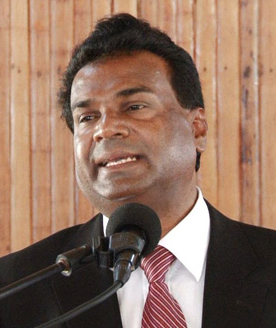The general public can now expect more information, especially as it relates to contract transparency, to be included in upcoming Guyana Extractive Industries Transparency Initiative (GY-EITI) reports as there have been changes to the International Standard.
This was revealed by the head of GY-EITI’s National Secretariat Rudy Jadoopat on Friday. Jadoopat spoke to Sunday Stabroek after attending the eighth EITI Global Conference last month, when the changes were announced.
The Standard that the EITI has been using was adopted in 2016, and according to Jadoopat, the new changes encompass areas such as environmental reporting, gender balance, trades by state-owned enterprises, contract transparency and project level reporting.
He said that the new disclosure requirements are expected to encourage deeper insights into the extractive sector and the changes will take effect immediately. However, reports that are published on or before December 21st this year can be validated against either the 2016 or this year’s Standard, while reports published after December 31st, 2019 will have to be validated against the new Standard.
As it relates to contract transparency, the Standard now includes that the implementing countries are required to disclose any contracts and licences that are granted, entered into or amended from January 1st, 2021. Prior to the changes, countries were encouraged to disclose the contracts, rather than it being mandatory.
4.2 (B) of the amended Standard also says that the Multi-Stakeholder Groups (MSG), which is the decision making body of the EITI, and is made up of representatives from government, civil society and industry, is now expected to develop plans for disclosing contracts integrated into work plans covering 2020 and onwards.
“In our work plan, we have to include how we plan to disclose contracts. This year, we are going to prepare our work plan for next year and we should state how we intend to disclose these contracts,” Jadoopat said, while also noting that 2.1 of the Standard, which addresses the legal framework and fiscal regime, is also affected.
The amended Standard now states that reporting should describe what contracts exist, which contracts are publicly available and where they can be accessed.
Standard 2.4 C, which dealt with defining contracts, now includes that reporting should describe government policy and actual practice.
As it relates to environmental reporting, the new requirements state that material environmental payments to government should be disclosed and that the disclosure of information relating to environmental impact and monitoring is encouraged.
The new Standard also makes significant additions and amendments as it relates to gender balance, and the requirement 1.4, which previously related to the MSG, now stipulates that the MSG is required to consider gender balance in their representation.
Requirement 6.3, which had to do with the contribution of the extractive sector to the economy, now includes reporting employment figure disaggregated by gender, project and role where available, while 7.1, which related to outcome and impact, now states that the MSG is required to consider access challenges and information needs of different genders and sub-groups.
Requirement 7.4, which dealt with the review of outcomes and impacts of EITI implementation, now has another section which states that the MSG is encouraged to document how it improved gender equality and social inclusion.
As it relates to commodity trading transparency, requirement 4.2, which previously dealt with the sale of state share of production and other revenues collected in kind, was amended for reporting on revenues for the sale of the state’s share of production of oil, gas or mineral resources, and says that it should be disaggregated by sales contract rather than by buyer.
“They also have another requirement, 4.2B, which states that disclosures on the process for selecting buyers and of sales contracts are encouraged and 4.2C which states that buying companies are encouraged to disclose their payments to the State for purchases of oil, gas and minerals,” Jadoopat said.
For state-owned enterprise transparency, which was covered by requirement 2.6, additional amendments say that implementing countries are required to describe the rules and practices governing transfers of funds between state-owned entities and the state, including joint ventures and subsidiaries.
Meanwhile, requirement 2.6 (A) now states that the details on loans or loan guarantees provided by the government and state-owned entities to mining and oil and gas companies should be disclosed, including the repayment schedule and interest rates, while 2.6 (B) states that state-owned entities are now expected to publish their audited financial statements.
Additionally, requirement 6.2, which dealt with quasi-financial expenditure, now includes that the MSG can apply the Inter-national Monetary Fund‘s definition of quasi-financial expenditure.
“As you can see, what was encouraged before are now actually becoming requirements. Standards have become stricter and they are tightening up in certain areas, such as contract transparency. If the country wants to adhere to the EITI Standard and remain within the EITI association it must, by the first of January 2021, disclose all contracts,” Jadoopat said.
He added that Minister of Natural Resources Raphael Trotman was present at the meeting and spoke on the panel about contract transparency. He said Trotman was even asked to be a member of the EITI International Committee on Contract Trans-parency and had told the gathering that government would be open to disclosing the contracts but indicated that there might be legal implications. He also said there is no specific reluctance now to disclose contracts.
The GY-EITI is a voluntary initiative that facilitates the submission of data from both private companies and government surrounding revenues and other data from the extractive industries to enhance transparency and accountability.
Guyana’s first report was compiled by Independent Administrator BDO LLP and released in April this year.






